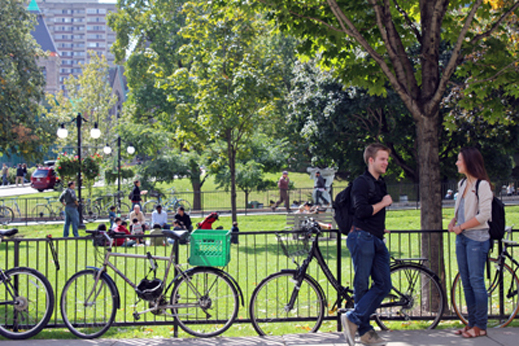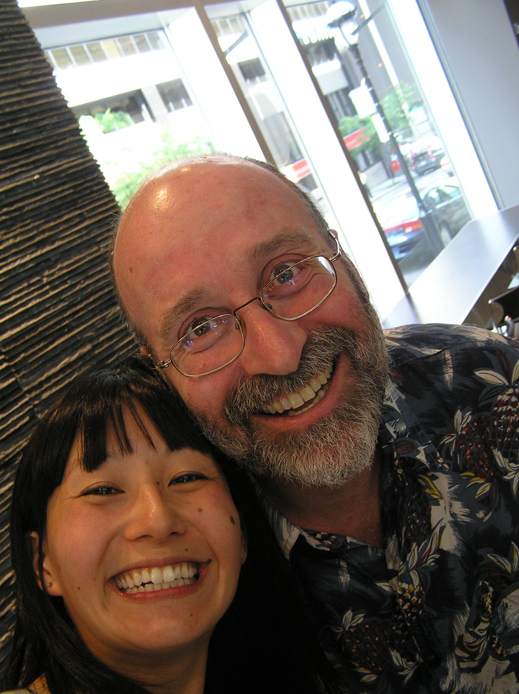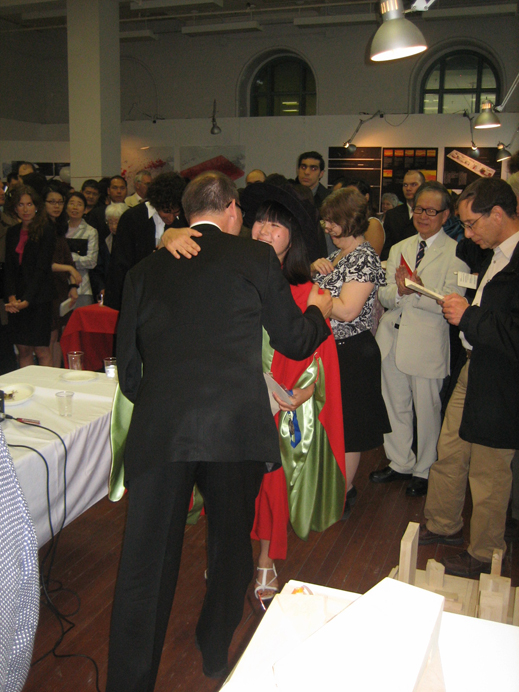
Hello Archinect,
This past Thursday, Michael Jemtrud was forced to resign as Director of McGill University School of Architecture. My response to this news is not unbiased. It is entirely biased because this is entirely personal. I want to tell you why this, for me, is the only possible response.
An institution requires a logo, a set of buildings and protocols, and the legal and financial capacity to grant degrees, hire employees, and command public attention. An institution is also built on traditions, community, and relationships built one at a time between the people who make themselves a part of it. It is a family, of sorts. [McGill University's lower campus]
[McGill University's lower campus]
For reasons both personal and professional, McGill’s School of Architecture has been the closest thing to a coherent family that I have known in my adult life. I came to Montreal as a twenty-one year old in the summer of 2002, to start in McGill's undergraduate program in architecture. That year, I thrived in some ways and struggled in others; while I soaked up much of what the school had to offer, that program wasn't quite right for me at that moment. With the advice of a number of professors and student colleagues, I transferred into the school's master's program in history and theory of architecture for the following year. [My History and Theory of Architecture colleagues]
[My History and Theory of Architecture colleagues]
During my master’s, I made friends with an entirely different community within the school while also happily (and wistfully) following the progress of my old studio-mates in the professional program. By surprise, I also ended up receiving funding for a doctoral project, and I decided to stay.
The five years of my PhD were among the happiest and most productive of my life. To be able to immerse yourself in something that fascinates you, purely because it fascinates you, and to share that experience with a community of colleagues and mentors—each of whom is also on their own journey, that they share in part with you—is an immense privilege. I also grew up in those years, as I started taking on roles in the school as a teaching and research assistant, grant writer, conference organizer, instructor, and so on. I learned what it means to be professional and to be part of an institutional community, to be part of a shared project and to take pleasure in my ability to both contribute to and receive assistance from this community. [A final review for a studio I co-taught]
[A final review for a studio I co-taught]
Some of these lessons I've probably only learned in retrospect, as I reflect on my time at McGill from a distance. And I admit that I’m nowhere near finished learning these life lessons. But I credit McGill for giving me the time and space and trust to start trying all of this on.
The McGill that gave me this gift isn't comprised of a faceless assortment of interchangeable roles and positions. Like a family, it is populated by individual characters. I could go through my own list of individuals--fellow students, professors, support staff, and visitors tangentially related to the school--who stand out in my memory as making it feel like home. These are the people who served as mentors, confidantes, and partners-in-crime, as well as some who I knew just in passing but who were there to share a joke, a kind word, or a necessary admonishment. I don't have to go through my list of such people, because you have your own. You know that it is all of these relationships that make any place worthwhile. [With administrator extraordinaire, David Krawitz, the day I left Montreal for Cambridge to attend the GSD.]
[With administrator extraordinaire, David Krawitz, the day I left Montreal for Cambridge to attend the GSD.]
For me, Michael Jemtrud was one of these people. My first contact with him was when I was writing a grant proposal with my doctoral supervisor, Alberto Pérez-Gómez. Alberto is primarily a theorist and historian who has critically unpacked the role of technology in architecture, and we wanted to strike out into what was, for us, somewhat new territory: not just theorizing but creatively engaging certain emerging technologies. Late in the game, we realized that we didn't have access to the necessary expertise or facilities at McGill. Although we were just days from the deadline, Alberto suggested that we get in touch with one of his former students, Michael Jemtrud, who was then an up-and-coming professor at Carleton University's well-regarded school of architecture.
I emailed a query to Michael, and within minutes got back a short response. It read something like "I am insanely busy for the next few days, but--anything for Alberto's crew. I will call this afternoon." We then spoke on the phone: Michael filled us in on the technical information, speculated with us on the critical content of our proposal, and promised collaboration and the shared use of his lab. We got the funding, and the result, several years later, was an event called MXT as well as a number of spin-off projects. I wasn't involved in the actual development of these projects, as I had moved on to the final stages of dissertation writing, then to starting my M.Arch.I at the GSD. But this is exactly the point: I am proud of the role I played in the project's early stages, and thrilled to see my colleagues—Alberto, Michael, Jason, Per, Anya, Paul, and many others—take it in directions that I could not have imagined.
When Michael started at the school as its director, I worked for him for just over a year as a research assistant. Mostly, I helped write grants to get funding that the school needed to launch his ambitious agenda of research and pedagogy. I had written a few grants before, but nothing as large and complex as this. Michael established the content of each grant but trusted me to coordinate certain details of its development, as well as to flesh out much of the text. There was also someone on our team who managed the technical details, and someone who established the financials and managed industrial and research partnerships. We worked for long days, and sometimes nights.
Michael made it entirely clear that he trusted each of us in the roles to which we were assigned, and that as a team—no matter who did what—we were responsible for producing a watertight product. He established a way of working that was casual and collegial, but precise and demanding. He'd listen to our thoughts; sometimes he'd take up our advice and other times he'd let us know why we were going to do things his way.
It was a good time. Once, on a trip to Ottawa to meet with a key stakeholder, I got carsick and threw up in the agency's parking lot. He held my backpack while I did my puked, then offered me a bottle of water, a stick of gum, and a friendly joke or two as we headed in. We nailed the meeting. Not that I had to do anything other than take notes, but just to say that this is how we worked: we got our jobs done.
This might sound trivial, but this experience—not just the vomiting but the entire year of working towards shared goals on a team—was a formative experience in my education. I realized that my writing is a valuable skill that I could hone and use, not just in my own projects but as part of a larger one. I found out how rewarding it is to work on a team when each person trusts their own judgment as well as that of others. And I learned that being collegial and professional means not only to sometimes agree to disagree, but to be able to work together towards a common goal even while recognizing differences in opinion or judgment.
This what I mean when I say that McGill is where I grew up. I did other work for Michael, and of course I had many other formative experiences at McGill, but these are the lessons from him that have stuck in my mind.
I also remember how, after every big deadline, Michael would say (or email) that we "did a great job" and that he "owes us a beer." I don't drink beer, and between his hectic schedule at school and his commitments to his family, Michael never really had the time to take the team out to a bar anyways. But that's my peculiarity, and his: Michael worked constantly because he believed that the school deserved the benefits of the next big project or initiative. And if he was demanding of his students and assistants he was many times more demanding toward himself. This wasn't just a job for him. It was personal.
It was personal for Michael because he values people at the school as people. I remember one evening when word had gotten back to him that, based on a technicality, Human Resources was going to refuse maternity benefits to an employee. I was working in the office at the time, so I had the pleasure of hearing Michael first cuss up a storm, then get in touch with the necessary parties to make sure that this wouldn’t happen. At the same time, he insisted that nobody tell this staff member about the problem: he didn’t want her to worry and he was taking care of it. [Getting a hug from Michael Jemtrud for an award I received on my doctoral dissertation in June 2010.]
[Getting a hug from Michael Jemtrud for an award I received on my doctoral dissertation in June 2010.]
Michael would not stand for the institution throwing out a person when they became inconvenient. Of course, this seems to be exactly what the institution is now doing to him—and not for a goal as banal as saving a few dollars, but for what seem to be much more disturbing reasons. Forcing Michael Jemtrud to resign is deeply un-collegial and un-professional in ways that, even in my most pessimistic moments, I never expected from McGill.
Because of everything that it has given to me, I feel deeply grateful and loyal to McGill as an institution. I’ve been back to Montreal and to campus several times since graduating, and each time, I feel an acute sense of nostalgia, of belonging, and of a continued shared mission. But all of this grows out of relationships with individual people. It’s really difficult for me to express how appalled and saddened I am that these two loyalties—to the institution, and to the individual people who for me comprised the institution—are now being pitted against each other.[McGill School of Architecture Graduation in June 2010!]
But it's not over yet. While Michael's resignation seems to be a done deal, the faculty appointment of Torben Berns (currently McGill's Planetary Society Visiting Professor in Architecture), another key player in the recent growth and ambition of the school, currently hangs in the balance. There are a number of projects, abilities, and qualities that Torben brings to the school, but for now I'd just like to mention one that is close to my heart: he has a substantial background and capability with technology, combined with a deep intellectual engagement in theory. With this combination, Torben is uniquely prepared to work with McGill students both in using emerging technologies in creative and critical ways, as well as in envisioning how the profession can and should use them in the future.
This is no small deal. To bring these things together within his own work, and within the conversations that take place within the school, changes everything. His initial hire was an ambitious initiative that Michael Jemtrud set into place, and crucial for the programs in research and teaching that are transforming the school. Over the past three years what I have seen myself, and heard from current students, is that Torben is among the most inspiring and engaging professors at McGill University. It would be a disaster for the school to lose him in the current political meltdown.
Thanks for reading.
Lian
This blog was most active from 2009-2013. Writing about my experiences and life at Harvard GSD started out as a way for me to process my experiences as an M.Arch.I student, and evolved into a record of the intellectual and cultural life of the Cambridge architecture (and to a lesser extent, design/technology) community, through live-blogs. These days, I work as a data storyteller (and blogger at Littldata.com) in San Francisco, and still post here once in a while.



No Comments
Block this user
Are you sure you want to block this user and hide all related comments throughout the site?
Archinect
This is your first comment on Archinect. Your comment will be visible once approved.